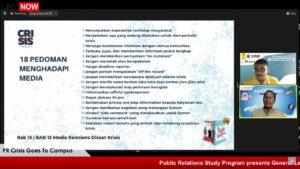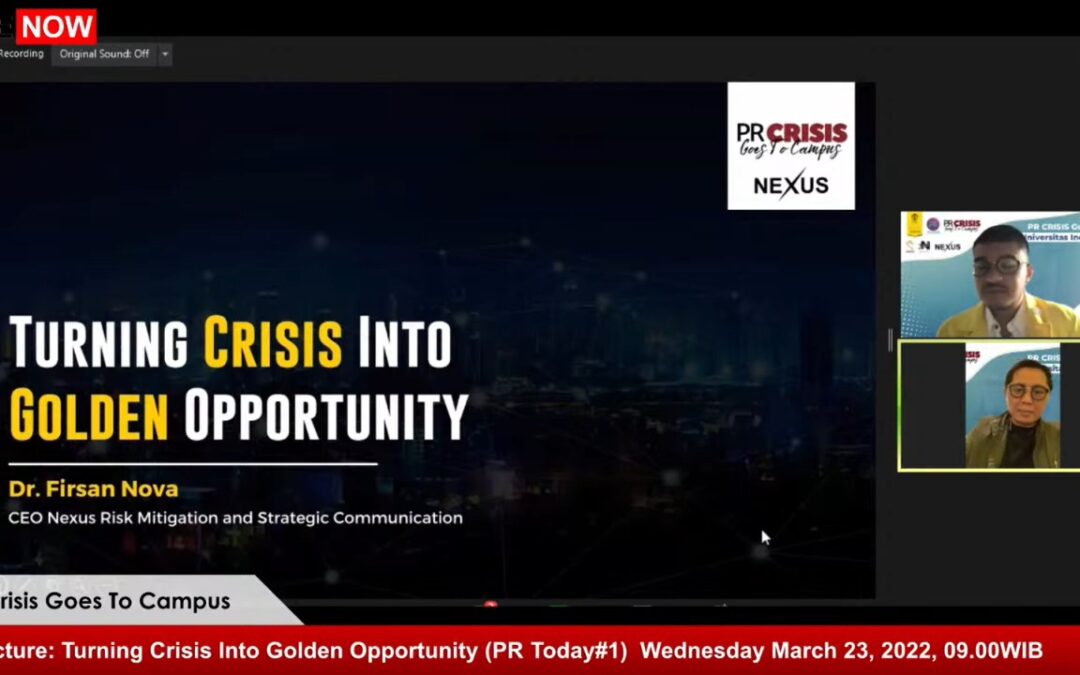Depok-Public Relations Study Program, Vocational Education Program of Universitas Indonesia (UI) held a series of public lectures with the “PR Today” theme. It consisted of several general lectures and guest lectures which were packaged in the form of webinars, discussing various matters related to the public relations industry. The public lecture with the title “PR Today #1: Turning Crisis into Golden Opportunity” started a series of “PR Today” activities which were held on March 23, 2022. This public lecture invited public relations practitioners as speakers, namely Dr. Firsan Nova, CEO of Nexus RMSC; Dian Agustine Nuriman, S.lkom, M.lkom, IAPR, Founder of NAGARU Communication & CEO of Umang Beach Club – Private Island Resort; and Mohammad Akbar, M.lkom, a journalist for Republika.
 (Photo: Discussion between speakers with webinar participants about the PR Crisis)
(Photo: Discussion between speakers with webinar participants about the PR Crisis)
Firsan explained that when a crisis arises, there will be five stages of grief, according to Kübler-Ross’ theory, namely rejection, anger, negotiation, depression, and acceptance. “When experiencing a crisis, everyone will go through these five stages. What can be done is to shorten the time after the crisis occurs. Another important thing is how to respond to the crisis and make it an opportunity that can determine its future,” said Firsan.
Not only individuals, a company can experience a crisis. It is because each company must build its own image. When the image is built, then a crisis can also occur. In handling crises, sometimes the potential arises to turn the crisis into an opportunity.
Dian said, “In building an image, the main thing that a company needs to do is give trust to the general public. When the trust were built, consumers will feel more secure. As public relations practitioners, we are obliged to build a positive image of a company.”
 (Photo: Dian explains an example of image building by a brand)
(Photo: Dian explains an example of image building by a brand)
An image will also not be formed by itself without any intervention from the media. When a company experiences a crisis, the media plays a role in handling the crisis. The role of the media becomes important as a means of delivering messages to the general public.
Akbar said that the first thing public relations practitioners need to do when a company is in crisis is to show the empathy for the community. “If a company tries to show empathy, then the media will be interested in framing it in a message that can be given to the public,” explained Akbar.
 (Photo: Akbar’s explanation about 18 Guidelines for Dealing with Mass Media)
(Photo: Akbar’s explanation about 18 Guidelines for Dealing with Mass Media)
Any information that public relations practitioners need to convey when experiencing a crisis must be complete and transparent. Disinformation can occur if the company is not able to provide honest information. It should be realized that crises can be handled properly through the ability of public relations practitioners to build the company’s image and their expertise in dealing with the media.







